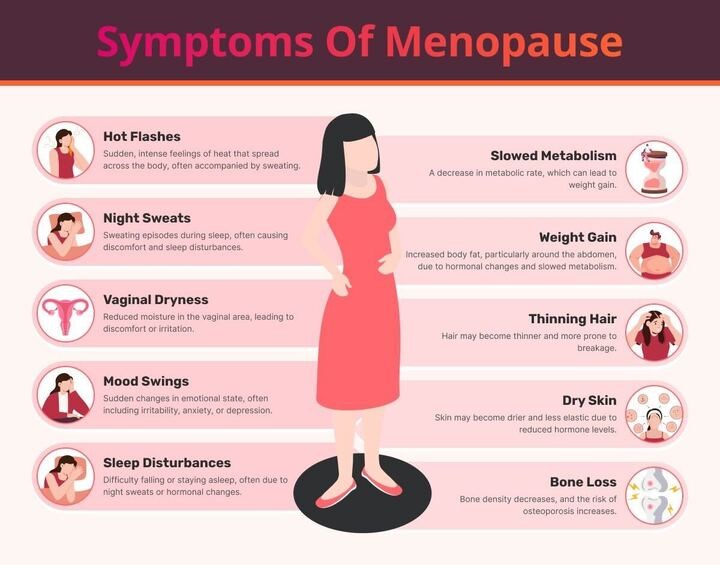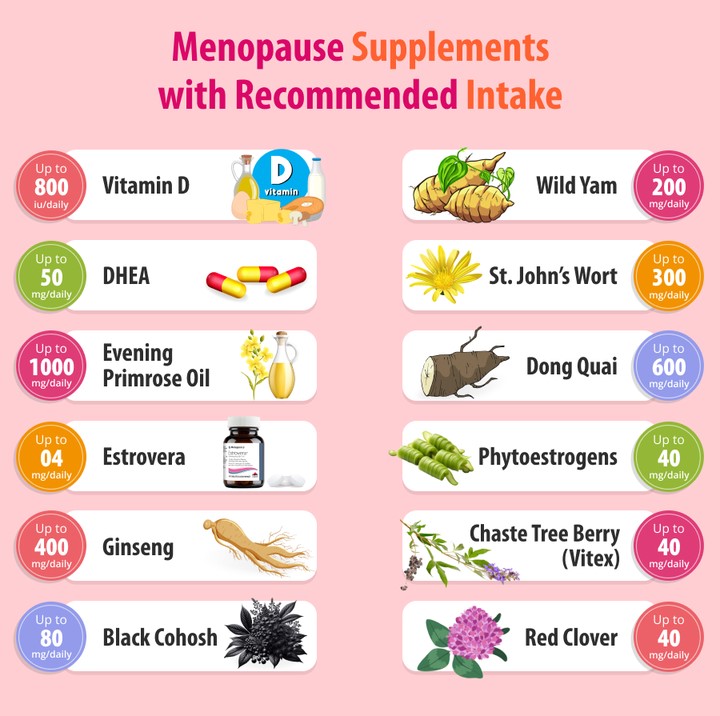What Is The Best Natural Hormone Replacement for Menopause?
Posted by Warren Cargal, L.Ac on Oct 20, 2024
More Menopause Related Content from Acupuncture Atlanta:
► 23 Herbs for Perimenopause to Improve Your Life!
► Seed Cycling for Hormonal Balance
► Menopause: A Woman's Cycle
► Herbs to Balance Qi
*Join Over 23k Community Members On Acupuncture Atlanta Facebook Page
*Connect With Holistic Like-Minded Followers Acupuncture Atlanta Instagram
*Stay Updated with Wellness Tips on Acupuncture Atlanta X (Twitter)
*Explore Health Insights on Acupuncture Atlanta YouTube Channel
SHOP PREMIUM CHINESE HERBAL REMEDIES AND SUPPLEMENTS FOR YOUR WELLNESS JOURNEY
ON THE ACUATLANTA ONLINE STORE
.
.
.
Menopause is a natural stage of life, but its symptoms—ranging from hot flashes and mood swings to weight gain and sleep disturbances—can be challenging for many women. As the body undergoes hormonal changes, particularly a decline in estrogen, these shifts can significantly impact well-being. For those seeking natural alternatives to synthetic hormone therapies, the question arises: What is the best natural hormone replacement for menopause?
The best natural hormone replacement for menopause focuses on estrogen supplementation through alternative methods, as estrogen is the primary hormone responsible for regulating menopausal symptoms. The North American Menopause Society has backed various natural approaches, supported by scientific studies showing their efficacy in alleviating symptoms such as hot flashes, vaginal dryness, and mood swings. Dr. Marcelle Pick, a recognized expert in women’s health, emphasizes the importance of individualized care, recommending natural hormone replacements that align with each woman’s unique needs.
Prominent figures like Dr. John R. Lee, a pioneer in the field of natural hormone therapy, have extensively researched the benefits of natural treatments, highlighting their role in promoting balance and comfort without the risks associated with synthetic options. Natural supplements such as Black Cohosh, Evening Primrose Oil, and Red Clover have been widely recommended for their ability to mimic estrogen’s effects, offering relief from menopause symptoms.
What are the Hormonal Changes During Menopause?

Menopause is characterized by a significant shift in hormone levels, particularly the decline of estrogen and progesterone, the two primary hormones that regulate the female reproductive system. As women age, the ovaries gradually reduce the production of these hormones, leading to the cessation of menstrual cycles and the onset of menopause. This decline triggers a cascade of physiological changes that affect various systems in the body.
The reduction in estrogen has a particularly profound impact, as this hormone plays a crucial role in maintaining not only reproductive health but also bone density, heart health, and even mood regulation. As estrogen levels drop, common symptoms of menopause, such as hot flashes, night sweats, vaginal dryness, and mood swings, begin to appear. Additionally, the body's metabolism slows, often leading to weight gain and changes in body composition.
Scientifically, menopause occurs when the number of ovarian follicles decreases, which leads to a decrease in estrogen. This causes the body to produce more FSH to try and get the ovaries to produce more estrogen. Once the body starts to realize that there are not enough ovarian follicles to use the FSH that is being sent, then menstruation stops. This hormonal imbalance creates an environment where the body can no longer sustain regular ovulation, marking the end of a woman’s reproductive years.
According to research published by the North American Menopause Society, this hormonal transition affects reproductive functions. It has widespread effects on other systems, including cardiovascular health, bone density, and cognitive function. The decline in estrogen is also linked to an increased risk of osteoporosis and heart disease, underscoring the importance of addressing these hormonal changes with appropriate treatments.
What is Hormone Replacement for Menopause?
Hormone replacement therapy (HRT) for menopause is a treatment that involves supplementing the body with hormones, primarily estrogen and sometimes progesterone, that the body no longer produces in sufficient amounts after menopause. The purpose of HRT is to relieve the uncomfortable symptoms associated with menopause, such as hot flashes, night sweats, vaginal dryness, and mood swings. These symptoms occur because the body's hormone levels, particularly estrogen, drop significantly during menopause.
Estrogen plays a key role in regulating many of the body's systems, and without it, women are at a higher risk of developing conditions such as osteoporosis and heart disease. By replacing this hormone, HRT helps to restore balance and reduce the severity of menopausal symptoms.
Scientific studies have consistently shown that hormone replacement therapy is effective in reducing the severity of menopausal symptoms. For instance, research published in the Journal of the American Medical Association (JAMA) found that women undergoing HRT experienced a significant reduction in the frequency and intensity of hot flashes and night sweats compared to those who did not receive hormone replacement. Moreover, the North American Menopause Society supports the use of hormone therapy for the short-term relief of menopausal symptoms, particularly for women under the age of 60 or within ten years of the onset of menopause.
You will need a prescription for synthetic or bioidentical hormones, which are chemically identical to the hormones naturally produced by the body. While medical hormone replacement is highly effective, it is not without risks. Long-term use of medical HRT has been linked to an increased risk of breast cancer, blood clots, and stroke, which is why healthcare providers recommend carefully evaluating each patient’s risk factors before starting therapy. Alternatively, many people are turning to traditional natural hormone replacement therapy with over-the-counter supplements or herbs to balance hormones rather than replacing the actual hormones.
What is Natural Hormone Replacement Therapy (HRT) for Menopause?
Natural Hormone Replacement Therapy (HRT) for menopause involves using natural support derived from natural sources to supplement the body's declining hormone levels, particularly estrogen and progesterone. These therapies aim to restore hormonal balance and alleviate common menopausal symptoms, such as hot flashes, night sweats, and mood swings. Natural HRT can either use bioidentical hormones, which are chemically identical to those produced by the body, or herbal supplements, which mimic the effects of hormones and help naturally regulate menopausal symptoms.
What are the Symptoms of Menopause?

A variety of symptoms accompanies menopause due to the hormonal changes, primarily the decline in estrogen and progesterone levels. Common symptoms include:
- Hot flashes: Sudden, intense feelings of heat that spread across the body, often accompanied by sweating.
- Night sweats: Sweating episodes during sleep, often causing discomfort and sleep disturbances.
- Vaginal dryness: Reduced moisture in the vaginal area, leading to discomfort or irritation.
- Mood swings: Sudden changes in emotional state, often including irritability, anxiety, or depression.
- Sleep disturbances: Difficulty falling or staying asleep, often due to night sweats or hormonal changes.
- Slowed metabolism: A decrease in metabolic rate, which can lead to weight gain.
- Weight gain: Increased body fat, particularly around the abdomen, due to hormonal changes and slowed metabolism.
- Thinning hair: Hair may become thinner and more prone to breakage.
- Dry skin: Skin may become drier and less elastic due to reduced hormone levels.
- Bone loss: Bone density decreases, and the risk of osteoporosis increases.
What is a Hot Flash?
A hot flash is a sudden feeling of intense heat that spreads over the body, often accompanied by sweating and flushed skin. It is one of the most common symptoms of menopause, caused by hormonal changes—particularly the drop in estrogen levels—that affect the body’s temperature regulation. Hot flashes vary in frequency and intensity, ranging from mild warmth to intense, uncomfortable heat.
What Are Menopause Supplements?
Menopause supplements are over-the-counter (OTC) products designed to help alleviate the symptoms of menopause, such as hot flashes, night sweats, mood swings, and vaginal dryness. Synthetic or bioidentical hormone replacement therapy (HRT) is meant to replenish the body’s declining hormone levels; however, menopause supplements typically contain natural ingredients like herbs, vitamins, and phytoestrogens. These ingredients aim to mimic the effects of estrogen or support overall hormonal balance in the body.
Natural estrogen formulas offer an alternative to synthetic hormone therapies without requiring a prescription. Common components of these supplements include Black Cohosh, Red Clover, Evening Primrose Oil, and Phytoestrogens (plant-based compounds that mimic estrogen). These natural ingredients have been widely studied and are known for their ability to alleviate menopause symptoms.
The efficacy of these supplements varies, with some studies showing positive results, especially in women with mild to moderate symptoms. For instance, research has demonstrated that Black Cohosh can help reduce hot flashes, while Red Clover has shown promise in improving mood and overall well-being. These supplements are available at AcuAtlanta for women seeking natural hormone support.
What Are the Best Menopause Supplements?

One effective way to care for your health during menopause is to provide your body with the nutrients that support the systems most affected by hormonal changes. Here’s a list of some of the best-known natural supplements to manage menopausal symptoms:
Vitamin D
 Vitamin D is essential for maintaining bone health, which becomes increasingly important during menopause as the risk of osteoporosis rises. It supports calcium absorption, promoting strong bones and reducing the likelihood of fractures. In addition to its bone health benefits, Vitamin D also plays a role in immune function and may help improve mood and prevent depression during menopause.
Vitamin D is essential for maintaining bone health, which becomes increasingly important during menopause as the risk of osteoporosis rises. It supports calcium absorption, promoting strong bones and reducing the likelihood of fractures. In addition to its bone health benefits, Vitamin D also plays a role in immune function and may help improve mood and prevent depression during menopause.
DHEA (Dehydroepiandrosterone)
 DHEA is a hormone the adrenal glands produce that declines with age, leading to various menopausal symptoms. Some studies suggest that supplementing with DHEA can help improve sexual function, mood, and bone density during menopause. It may also support overall energy levels and well-being, although a healthcare professional should closely monitor its use.
DHEA is a hormone the adrenal glands produce that declines with age, leading to various menopausal symptoms. Some studies suggest that supplementing with DHEA can help improve sexual function, mood, and bone density during menopause. It may also support overall energy levels and well-being, although a healthcare professional should closely monitor its use.
Evening Primrose Oil
 Evening Primrose Oil contains gamma-linolenic acid (GLA), a fatty acid known for its anti-inflammatory properties. This oil is often used to help manage hot flashes, breast tenderness, and mood swings associated with menopause. While many women report improvements, scientific studies show mixed results, making it essential to consult a doctor before use.
Evening Primrose Oil contains gamma-linolenic acid (GLA), a fatty acid known for its anti-inflammatory properties. This oil is often used to help manage hot flashes, breast tenderness, and mood swings associated with menopause. While many women report improvements, scientific studies show mixed results, making it essential to consult a doctor before use.
Estrovera
 Estrovera is a natural supplement containing rhapsodic rhubarb extract, which has been shown to reduce menopausal symptoms like hot flashes and night sweats. Clinical studies support its efficacy as an alternative to hormone replacement therapy (HRT). Many women prefer Estrovera due to its effectiveness and minimal side effects.
Estrovera is a natural supplement containing rhapsodic rhubarb extract, which has been shown to reduce menopausal symptoms like hot flashes and night sweats. Clinical studies support its efficacy as an alternative to hormone replacement therapy (HRT). Many women prefer Estrovera due to its effectiveness and minimal side effects.
Ginseng
 Ginseng has been traditionally used in Eastern medicine to boost energy and enhance mood. Some studies suggest that it can help alleviate menopausal symptoms, including fatigue, stress, and even sexual dysfunction. It is considered a safe and natural option for those looking to manage the emotional and physical challenges of menopause.
Ginseng has been traditionally used in Eastern medicine to boost energy and enhance mood. Some studies suggest that it can help alleviate menopausal symptoms, including fatigue, stress, and even sexual dysfunction. It is considered a safe and natural option for those looking to manage the emotional and physical challenges of menopause.
Black Cohosh
 Black Cohosh is one of the most widely researched and recommended herbs for managing menopause symptoms. It is known for its ability to mimic estrogen, providing relief from hot flashes, mood swings, and night sweats. Clinical studies, such as those published in the Journal of Women’s Health, have found that Black Cohosh is effective for many women, although it may not work for everyone.
Black Cohosh is one of the most widely researched and recommended herbs for managing menopause symptoms. It is known for its ability to mimic estrogen, providing relief from hot flashes, mood swings, and night sweats. Clinical studies, such as those published in the Journal of Women’s Health, have found that Black Cohosh is effective for many women, although it may not work for everyone.
Chaste Tree Berry (Vitex)
 Chaste Tree Berry, also known as Vitex, has been used for centuries to regulate hormones, particularly progesterone. It is commonly used to relieve symptoms of PMS and menstrual irregularities but has also been shown to help with menopausal symptoms like hot flashes and mood swings. Vitex is often recommended for women who experience hormonal imbalances during the transition into menopause.
Chaste Tree Berry, also known as Vitex, has been used for centuries to regulate hormones, particularly progesterone. It is commonly used to relieve symptoms of PMS and menstrual irregularities but has also been shown to help with menopausal symptoms like hot flashes and mood swings. Vitex is often recommended for women who experience hormonal imbalances during the transition into menopause.
Red Clover
 Red Clover is rich in isoflavones, a type of phytoestrogen that mimics the effects of estrogen in the body. This herb is commonly used to help reduce the frequency and intensity of hot flashes and night sweats. Scientific studies have shown promising results in improving overall well-being and reducing menopausal discomfort in women who take Red Clover regularly.
Red Clover is rich in isoflavones, a type of phytoestrogen that mimics the effects of estrogen in the body. This herb is commonly used to help reduce the frequency and intensity of hot flashes and night sweats. Scientific studies have shown promising results in improving overall well-being and reducing menopausal discomfort in women who take Red Clover regularly.
Wild Yam
 Wild Yam is often used in natural hormone creams and is believed to contain compounds that mimic progesterone. It has become a popular choice for women who experience progesterone deficiency during menopause. While widely used, more scientific research is needed to confirm its effectiveness in reducing menopausal symptoms such as hot flashes and vaginal dryness.
Wild Yam is often used in natural hormone creams and is believed to contain compounds that mimic progesterone. It has become a popular choice for women who experience progesterone deficiency during menopause. While widely used, more scientific research is needed to confirm its effectiveness in reducing menopausal symptoms such as hot flashes and vaginal dryness.
St. John’s Wort
 St. John’s Wort is known for its antidepressant properties and is often used to manage mood swings, mild depression, and anxiety during menopause. Many women use this herb to stabilize their emotions and enhance their overall mental health during this transitional phase. However, it is important to consult a doctor before use, as it may interact with other medications.
St. John’s Wort is known for its antidepressant properties and is often used to manage mood swings, mild depression, and anxiety during menopause. Many women use this herb to stabilize their emotions and enhance their overall mental health during this transitional phase. However, it is important to consult a doctor before use, as it may interact with other medications.
Dong Quai
 Dong Quai is a traditional Chinese herb often called the "female ginseng" due to its ability to support hormonal balance in women. It is commonly used to alleviate symptoms such as hot flashes, vaginal dryness, and irregular periods. While its effectiveness varies from person to person, Dong Quai has long been valued in Eastern medicine for its ability to promote overall well-being during menopause.
Dong Quai is a traditional Chinese herb often called the "female ginseng" due to its ability to support hormonal balance in women. It is commonly used to alleviate symptoms such as hot flashes, vaginal dryness, and irregular periods. While its effectiveness varies from person to person, Dong Quai has long been valued in Eastern medicine for its ability to promote overall well-being during menopause.
Phytoestrogens
 Phytoestrogens are plant-based compounds that mimic estrogen in the body and can help alleviate symptoms of menopause. Found in foods like soy and flaxseed and herbal supplements like Red Clover, phytoestrogens can naturally regulate declining hormone levels. These supplements are particularly beneficial for women looking for non-synthetic alternatives.
Phytoestrogens are plant-based compounds that mimic estrogen in the body and can help alleviate symptoms of menopause. Found in foods like soy and flaxseed and herbal supplements like Red Clover, phytoestrogens can naturally regulate declining hormone levels. These supplements are particularly beneficial for women looking for non-synthetic alternatives.
What is the Best Natural Hormone Replacement Therapy for Menopause?
When seeking the best natural hormone replacement therapy for menopause, two primary approaches are often considered: bioidentical hormone replacement therapy (BHRT) and traditional natural hormone replacement therapy with herbs and supplements. Bioidentical hormone replacement focuses on using hormones chemically identical to the body's. In contrast, traditional natural hormone therapy relies on herbs and plant-based supplements to mimic the effects of hormones and alleviate menopausal symptoms. For the best traditional natural hormone replacement therapy, shop the comprehensive selection at AcuAtlanta.
Bioidentical Hormone Replacement Therapy (BHRT)

More Menopause Related Content from Acupuncture Atlanta:
► 23 Herbs for Perimenopause to Improve Your Life!
► Seed Cycling for Hormonal Balance
► Menopause: A Woman's Cycle
► Herbs to Balance Qi
*Join Over 23k Community Members On Acupuncture Atlanta Facebook Page
*Connect With Holistic Like-Minded Followers Acupuncture Atlanta Instagram
*Stay Updated with Wellness Tips on Acupuncture Atlanta X (Twitter)
*Explore Health Insights on Acupuncture Atlanta YouTube Channel
SHOP PREMIUM CHINESE HERBAL REMEDIES AND SUPPLEMENTS FOR YOUR WELLNESS JOURNEY
ON THE ACUATLANTA ONLINE STORE
.
.
.
Bioidentical Hormone Replacement Therapy (BHRT) involves using hormones that are chemically identical to the estrogen, progesterone, and sometimes testosterone naturally produced by the body. This therapy is tailored to each woman’s hormonal needs, allowing for a more personalized approach. BHRT is often prescribed to alleviate symptoms such as hot flashes, night sweats, and mood swings by restoring hormonal balance. Studies have shown that BHRT can be an effective alternative to synthetic hormone replacement therapies, providing relief from menopausal symptoms while minimizing some of the risks associated with synthetic options. However, women must work closely with a healthcare provider to monitor their progress and adjust dosages as needed. While BHRT offers a personalized approach using bioidentical hormones, many women prefer a more holistic alternative with plant-based supplements to manage hormonal changes.
Traditional Natural Hormone Replacement Therapy
Traditional Natural Hormone Replacement Therapy uses plant-based compounds and herbs to mimic the body’s natural hormone production, specifically estrogen and progesterone, which decline during menopause. This therapy plays a crucial role in alleviating menopausal symptoms by supplementing the body's declining hormone levels, leading to improved well-being and comfort during this transitional phase. Many women opt for traditional natural hormone therapy as an alternative to synthetic options due to its natural sources and its focus on mimicking the body's hormones.
For example, supplements like Black Cohosh and Red Clover have been widely used, with numerous women reporting significant relief from hot flashes, mood swings, and night sweats. Research published in the Journal of Women's Health supports the efficacy of Black Cohosh in reducing menopause symptoms. At the same time, Red Clover has shown promise in studies for improving overall mood and well-being. The impact of using these therapies can lead to a reduction in discomfort and enhanced quality of life during menopause.
While both bioidentical hormone replacement therapy (BHRT) and traditional natural hormone therapy provide effective options for managing menopause symptoms, the decision between the two often comes down to personal preferences, lifestyle factors, and specific health needs. Some women may prefer the tailored approach of BHRT, which closely mimics the body’s natural hormones. In contrast, others might lean toward traditional natural remedies focusing on plant-based supplements and holistic well-being. Ultimately, the best choice depends on individual comfort with each method, potential side effects, and discussions with a healthcare provider to ensure the safest and most effective treatment.
Are There Side Effects of Natural Hormone Replacement for Menopause?
Yes, natural hormone replacement therapy (HRT) can have side effects, though they are often milder compared to synthetic options. Common side effects include digestive issues such as nausea, headaches, and, in some cases, liver issues (particularly with supplements like Black Cohosh). Women must monitor their bodies and consult a healthcare provider if they experience unusual symptoms. While these natural therapies can provide relief, they may not suit everyone, especially those with underlying health conditions.
What are the Potential Risks of Natural Hormone Replacement?
The potential risks of natural hormone replacement therapy vary depending on whether herbal supplements or bioidentical hormones are used. For supplements like Black Cohosh, Red Clover, and Evening Primrose Oil, risks may include digestive discomfort, allergic reactions, or interactions with other medications. Some Chinese herbs may not be safe for women with certain health conditions, such as liver disease or breast cancer. For bioidentical hormone therapy, while generally considered safer than synthetic HRT, there are still risks of side effects such as blood clots, stroke, and cancer, particularly with long-term use. It's essential to consult a healthcare provider to determine the safest approach.
Can Natural Hormone Replacement Therapy be Used in Perimenopause?
Yes, natural hormone replacement therapy (HRT) can be used during perimenopause, the transitional stage before menopause, when hormone levels begin to fluctuate. Perimenopause typically starts in a woman's 40s but can begin earlier and last for several years. During this time, estrogen and progesterone levels may rise and fall unpredictably, leading to symptoms such as irregular periods, hot flashes, mood swings, and sleep disturbances.
Natural HRT, including bioidentical hormones and herbal supplements, can help balance these fluctuating hormones and alleviate symptoms. Bioidentical hormone therapy closely matches the body’s natural hormones, offering a personalized approach to hormone replacement. Herbal supplements like Black Cohosh, Red Clover, and Chaste Tree Berry can also support hormonal balance by mimicking estrogen or helping to regulate progesterone levels.











